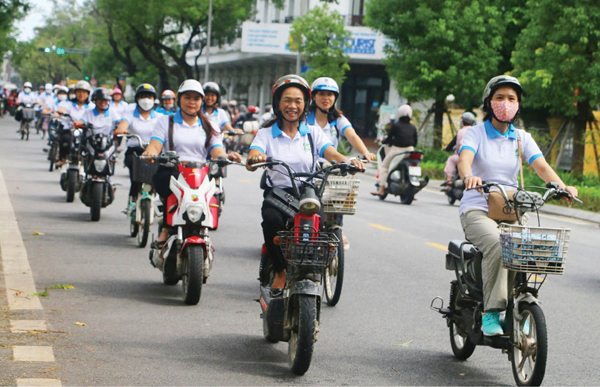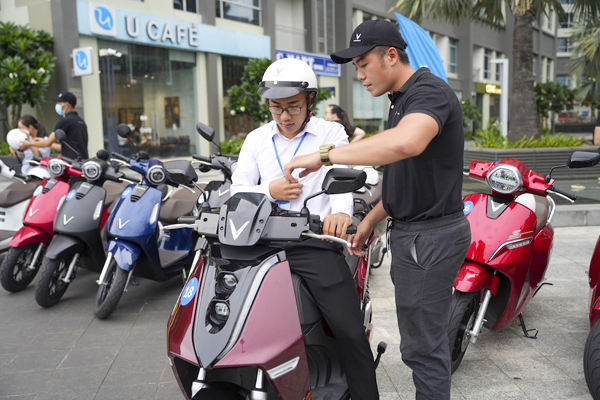Lack of Policies Promoting Electric Vehicules
The move from gasoline to electric motorcycles is proving difficult. Authorities must evaluate and quickly implement compelling, complete incentive packages for electric bikes.
Electric Motorcycles Await Policy
The Ho Chi Minh City Development Research Institute has submitted a proposal to the city's People's Committee, which will then present it to the City's People's Council, to develop a resolution on policies, incentives, and preferences to encourage individuals and households to switch from gasoline to electric motorcycles. This experiment will begin in the Can Gio district before expanding across the entire city. As a result, the city will implement incentive programs for new electric vehicle sales, including reduced registration fees and license plates, lower interest rates on new car loans, and subsidies for switching from gasoline to electric motorbikes.

According to the government's roadmap, by 2050, all transport vehicles will transition to electric, green energy. (Illustration)
Specifically, from 2024-2025, poor families would receive 100% of the expenses, while near-poor households will receive 80% of the costs, for the conversion of gasoline motorbikes to electric ones. Other people and families will receive full support for registration costs and license plates, as well as a 4% annual loan interest rate for those purchasing electric bikes on installment plans.
Individuals and households are urged and assisted to convert gasoline bikes to electric motorcycles beginning in 2026-2027, with the goal of converting one electric motorbike per family. Meanwhile, the previous phase's support policies for registration fees, license plates, and loan interest rates will be maintained. From 2028 to 2030, the Can Gio district will keep its assistance measures for transitioning gasoline motorcycles to electric motorcycles. By this time, all persons and homes in Can Gio district would have transitioned to electric bikes.
Following this information, many people agree and recommend that the implementation be accelerated and spread to additional districts and wards around the city. Some people ask what happens in other areas of the country, not only Ho Chi Minh City.
According to the government's plan, Vietnam intends to steadily reduce, and finally eliminate, the manufacture, assembly, and import of fossil-fuel-powered vehicles, motorbikes, and scooters by 2040. By 2050, all cars will be powered by electric and renewable energy.
Major Challenges
However, according to Ministry of Transport figures, electric bikes would account for just around 2.5 million of the 75 million registered motorcycles by the end of 2023. This number suggests that gasoline bikes continue to dominate. This might have an impact on the objective of gradually reducing, and finally eliminating, the manufacturing and import of vehicles and motorbikes powered by fossil fuels by 2050.

To date, the incentive policies for electric motorcycles are still lacking. (Illustration)
According to engineer Nguyen Minh Dong, Director of Duc Viet Technology Company (Ho Chi Minh City), in the motorcycle sector, to achieve the above goal, two major challenges must be overcome. First, the majority of Vietnamese consumers are still accustomed to using gasoline motorcycles daily. Gasoline motorcycles have been familiar to people for many years, while electric motorcycles are still relatively new. Second, the major motorcycle companies, which currently hold large market shares, are still focusing on gasoline motorcycles. These companies have a long history of development in Vietnam, having invested heavily in production and marketing. Transitioning to electric motorcycles could be a risky "bet." It would be like starting from scratch, with development, production, and marketing costs increasing manifold, facing the risk of decreased sales and market share. Therefore, they might focus on gasoline motorcycles to preserve profits, showing little enthusiasm for transitioning.
Meanwhile, incentive measures for electric bikes remain inadequate. For example, electric automobiles are free from registration taxes, but electric motorbikes are not; electric motorcyclists still pay the same license plate fees as gasoline motorcycles...
Currently, electric bikes offer cheaper daily and maintenance expenditures than gasoline motorcycles. Electric bikes come in a range of styles, can go longer distances, and charge their batteries faster. However, the purchasing price remains high. Only when electric bikes become more affordable than gasoline motorcycles, along with additional incentives, will the changeover process be expedited.
According to engineer Nguyen Minh Dong, based on a recommendation from the Ho Chi Minh City Development Research Institute, authorities should evaluate and implement appealing, complete incentive schemes for electric bikes while gradually restricting gasoline motorcycles.








